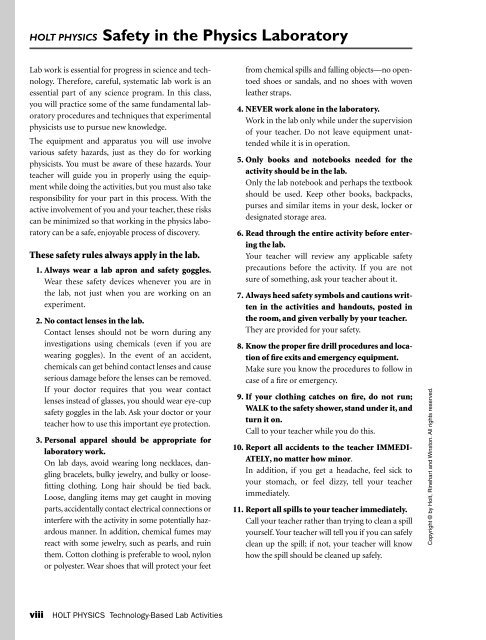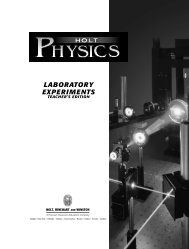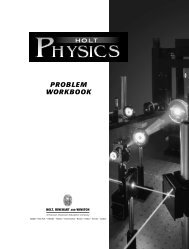TECHNOLOGY-BASED LAB ACTIVITIES
Lab Activities (PE).pdf - langlopress.net
Lab Activities (PE).pdf - langlopress.net
Create successful ePaper yourself
Turn your PDF publications into a flip-book with our unique Google optimized e-Paper software.
HOLT PHYSICS Safety in the Physics Laboratory<br />
Lab work is essential for progress in science and technology.<br />
Therefore, careful, systematic lab work is an<br />
essential part of any science program. In this class,<br />
you will practice some of the same fundamental laboratory<br />
procedures and techniques that experimental<br />
physicists use to pursue new knowledge.<br />
The equipment and apparatus you will use involve<br />
various safety hazards, just as they do for working<br />
physicists. You must be aware of these hazards. Your<br />
teacher will guide you in properly using the equipment<br />
while doing the activities, but you must also take<br />
responsibility for your part in this process. With the<br />
active involvement of you and your teacher, these risks<br />
can be minimized so that working in the physics laboratory<br />
can be a safe, enjoyable process of discovery.<br />
These safety rules always apply in the lab.<br />
1. Always wear a lab apron and safety goggles.<br />
Wear these safety devices whenever you are in<br />
the lab, not just when you are working on an<br />
experiment.<br />
2. No contact lenses in the lab.<br />
Contact lenses should not be worn during any<br />
investigations using chemicals (even if you are<br />
wearing goggles). In the event of an accident,<br />
chemicals can get behind contact lenses and cause<br />
serious damage before the lenses can be removed.<br />
If your doctor requires that you wear contact<br />
lenses instead of glasses, you should wear eye-cup<br />
safety goggles in the lab. Ask your doctor or your<br />
teacher how to use this important eye protection.<br />
3. Personal apparel should be appropriate for<br />
laboratory work.<br />
On lab days, avoid wearing long necklaces, dangling<br />
bracelets, bulky jewelry, and bulky or loosefitting<br />
clothing. Long hair should be tied back.<br />
Loose, dangling items may get caught in moving<br />
parts, accidentally contact electrical connections or<br />
interfere with the activity in some potentially hazardous<br />
manner. In addition, chemical fumes may<br />
react with some jewelry, such as pearls, and ruin<br />
them. Cotton clothing is preferable to wool, nylon<br />
or polyester. Wear shoes that will protect your feet<br />
from chemical spills and falling objects—no opentoed<br />
shoes or sandals, and no shoes with woven<br />
leather straps.<br />
4. NEVER work alone in the laboratory.<br />
Work in the lab only while under the supervision<br />
of your teacher. Do not leave equipment unattended<br />
while it is in operation.<br />
5. Only books and notebooks needed for the<br />
activity should be in the lab.<br />
Only the lab notebook and perhaps the textbook<br />
should be used. Keep other books, backpacks,<br />
purses and similar items in your desk, locker or<br />
designated storage area.<br />
6. Read through the entire activity before entering<br />
the lab.<br />
Your teacher will review any applicable safety<br />
precautions before the activity. If you are not<br />
sure of something, ask your teacher about it.<br />
7. Always heed safety symbols and cautions written<br />
in the activities and handouts, posted in<br />
the room, and given verbally by your teacher.<br />
They are provided for your safety.<br />
8. Know the proper fire drill procedures and location<br />
of fire exits and emergency equipment.<br />
Make sure you know the procedures to follow in<br />
case of a fire or emergency.<br />
9. If your clothing catches on fire, do not run;<br />
WALK to the safety shower, stand under it, and<br />
turn it on.<br />
Call to your teacher while you do this.<br />
10. Report all accidents to the teacher IMMEDI-<br />
ATELY, no matter how minor.<br />
In addition, if you get a headache, feel sick to<br />
your stomach, or feel dizzy, tell your teacher<br />
immediately.<br />
11. Report all spills to your teacher immediately.<br />
Call your teacher rather than trying to clean a spill<br />
yourself. Your teacher will tell you if you can safely<br />
clean up the spill; if not, your teacher will know<br />
how the spill should be cleaned up safely.<br />
Copyright © by Holt, Rinehart and Winston. All rights reserved.<br />
viii<br />
HOLT PHYSICS Technology-Based Lab Activities





